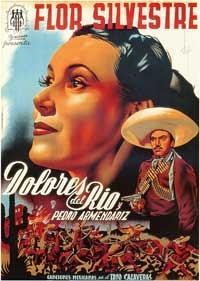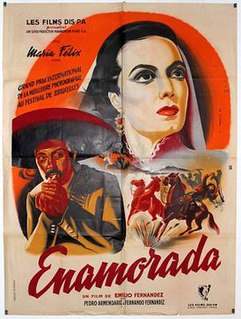
Pedro Armendáriz Bohr, better known by his stage name Pedro Armendáriz Jr., was a Mexican actor who made films and television series from the United States and Mexico.

Pedro Armendáriz was a Mexican film actor who made films in both Mexico and the United States. With Dolores del Río and María Félix, he was one of the best-known Latin American movie stars of the 1940s and 1950s.
The Academia Mexicana de Artes y Ciencias Cinematográficas was founded on July 3, 1946, in Mexico City.

The Golden Age of Mexican cinema is a period in the history of the Cinema of Mexico between 1933 and 1964 when the Mexican film industry reached high levels of production, quality and economic success of its films, besides having gained recognition internationally. The Mexican film industry became the center of commercial films in Latin America.

Irasema Dilián was a actress. Born in Brazil to Polish parents, she began her film career in Italy, and appeared in Italian, Spanish and Mexican films.

The Brute is a 1953 Mexican drama film directed by Luis Buñuel and starring Pedro Armendáriz and Katy Jurado.

Wild Flower is a 1943 Mexican historical film directed by Emilio Fernández and starring Dolores del Río and Pedro Armendáriz. It is the first Mexican movie of Dolores del Río after her career in Silent and Golden Age's Hollywood films. It's the first movie of an extended collaboration between Fernández-Del Rio-Armendáriz, Gabriel Figueroa (cinematography) and Mauricio Magdaleno (writer). It also marked the debut of Emilia Guiú in a small role as an extra. The film is considered one of the defining films of the Golden Age of Mexican cinema.

The Unloved Woman is a 1949 Mexican drama film directed by Emilio Fernández and starring Dolores del Río and Pedro Armendáriz. It is based on the 1913 play of the same title by Jacinto Benavente. The work had already been adapted several times, including the 1940 Spanish film The Unloved Woman.
The Great Adventure of Zorro is a 1976 film starring Rodolfo de Anda in a Mexican version of Zorro, directed by Raúl de Anda and featuring such actors as Helena Rojo and Pedro Armendáriz, Jr.

Reportaje is a 1953 Mexican film. The film brought together an extraordinary ensemble cast of the most important stars of the Golden Age of Mexican cinema and was held for charitable purposes for the A.N.D.A (Asociación Nacional de Actores) of México.

Enamorada ("Enamoured") is a 1946 Mexican drama film directed by Emilio Fernández and starring María Félix and Pedro Armendáriz. It was shot at the Churubusco Studios in Mexico City and on location in Puebla. The sets were designed by the art director Manuel Fontanals
Miguel Contreras Torres was a Mexican-born actor, screenwriter, film producer and director.
Rosario de amor is a Mexican telenovela produced by Guillermo Diazayas for Televisa in 1978.
Julia is a Mexican telenovela produced by Irene Sabido for Televisa in 1979.
Soledad's Shawl is a 1952 Mexican western film directed by Roberto Gavaldón and starring Arturo de Córdova, Pedro Armendáriz and Estela Inda. The film's sets were designed by the art director Salvador Lozano Mena. A Doctor moves to a poor rural area where he falls in love with a peasant girl.
La culpa is a Mexican telenovela produced by Yuri Breña and Pinkye Morris for Televisa. It premiered on Canal de las Estrellas on August 12, 1996 and ended on October 11, 1996.
The Ariel Award for Best Actor is an award presented by the Academia Mexicana de Artes y Ciencias Cinematográficas (AMACC) in Mexico. It is given in honor of an actor who has delivered an outstanding performance in a leading role while working within the Mexican film industry. In 1947, the 1st and 2nd Ariel Awards were held, with Domingo Soler and David Silva winning for the films La Barraca and Campeón Sin Corona, respectively. With the exception of the years 1959 to 1971, when the Ariel Awards were suspended, the award has been given annually. Nominees and winners are determined by a committee formed every year consisting of academy members, previous winners and individuals with at least two Ariel nominations; the committee members submit their votes through the official AMACC website.
The Ariel Award for Best Supporting Actor is an award presented by the Academia Mexicana de Artes y Ciencias Cinematográficas (AMACC) in Mexico. It is given in honor of an actor who has delivered an outstanding performance in a supporting role while working within the Mexican film industry. In 1947, the 1st and 2nd Ariel Awards were held, with José Baviera and Fernando Soto winning for the films La Barraca and Campeón Sin Corona, respectively. With the exception of the years 1958 to 1971, when the Ariel Awards were suspended, the award has been given annually. Nominees and winners are determined by a committee formed every year consisting of academy members, previous winners and individuals with at least two Ariel nominations; the committee submit their votes through the official AMACC website.

I'm a Real Mexican is a 1942 Mexican comedy thriller film directed by Emilio Fernández and starring Pedro Armendariz, Janet Alcoriza and David Silva. Its plot has drawn comparisons to the American All Through the Night released the same year.
This page is based on this
Wikipedia article Text is available under the
CC BY-SA 4.0 license; additional terms may apply.
Images, videos and audio are available under their respective licenses.









